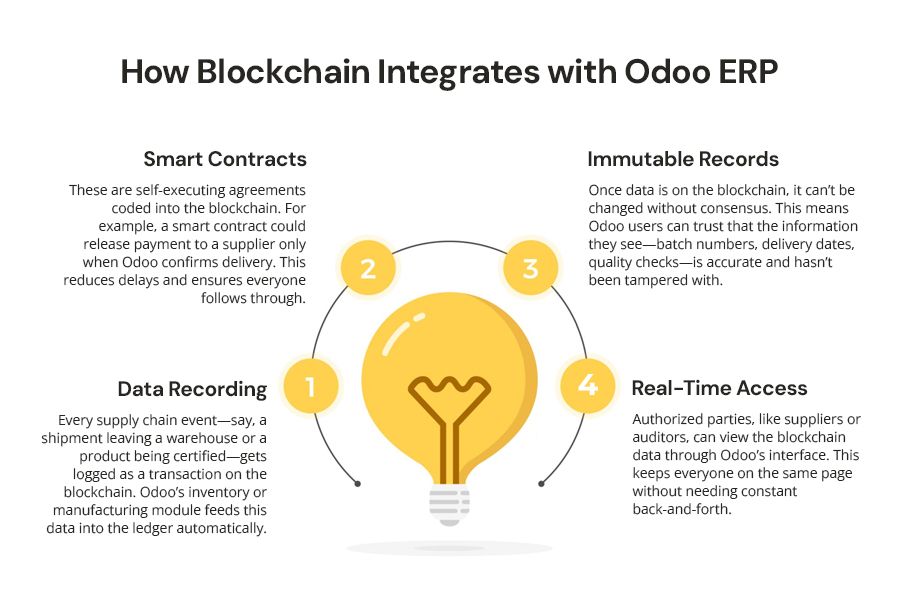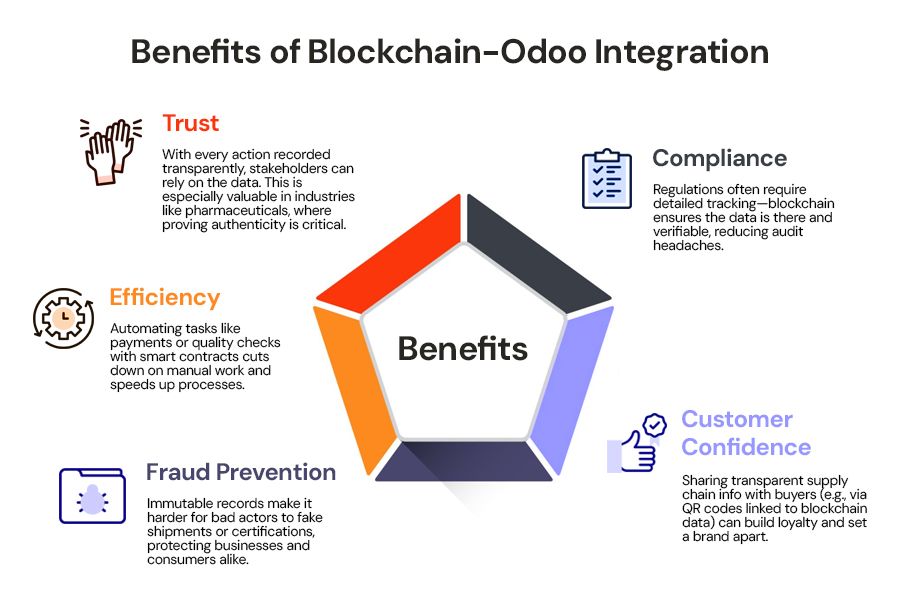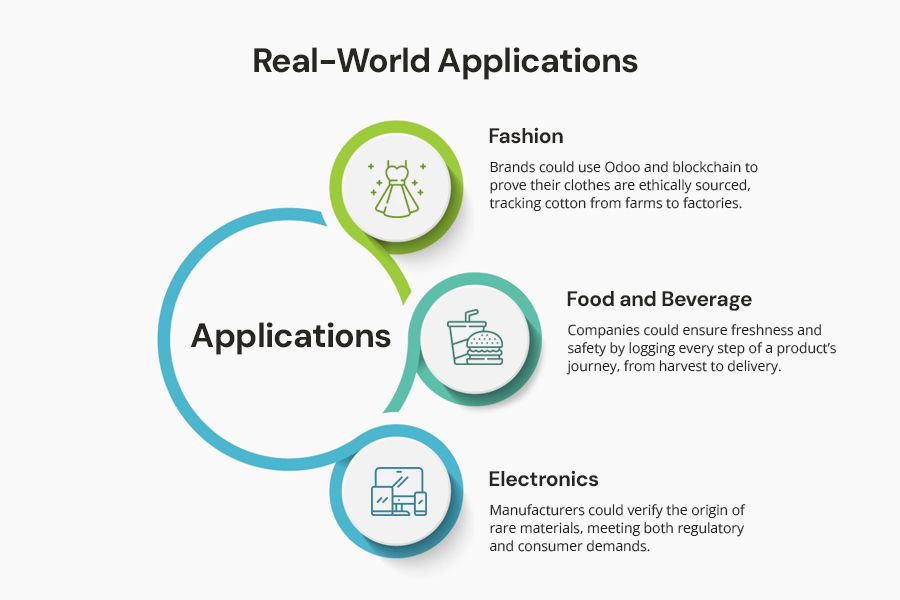
The world of enterprise resource planning (ERP) systems is evolving, and businesses are constantly looking for ways to improve efficiency, trust, and visibility in their operations. Odoo ERP, a popular modular software solution, has gained traction for its flexibility and ability to adapt to various industries. Meanwhile, Web3 technologies, particularly blockchain, are making waves by offering decentralized, secure, and transparent ways to manage data. Combining Odoo ERP with blockchain could transform supply chain management, bringing a new level of accountability and clarity to an often-complex process. This article explores how Odoo ERP software development can integrate with blockchain to improve supply chain transparency, why it matters, and what businesses stand to gain.
Understanding Odoo ERP and Its Role in Business
Odoo is an open-source ERP system that covers a wide range of business functions, from accounting and inventory management to customer relationship management (CRM) and e-commerce. Unlike traditional ERP systems that can be rigid and expensive, Odoo stands out for its modular design. Companies can pick and choose the modules they need, making it a practical choice for small-to-medium enterprises (SMEs) as well as larger organisations. Its adaptability has made it a go-to solution for businesses aiming to streamline operations without breaking the bank.
At its core, Odoo helps businesses organise their processes by centralising data. For supply chain management, this means tracking inventory, managing orders, and coordinating with suppliers—all from a single platform. However, even with a system like Odoo, supply chains can still suffer from a lack of transparency. Data silos, human errors, and fraud can obscure what’s really happening as goods move from point A to point B. This is where blockchain comes into play, offering a way to address these gaps and build trust across the supply chain.
What Is Blockchain and Web3?
Before diving into the integration, let’s clarify what blockchain and Web3 mean in this context. Blockchain is a decentralized digital ledger that records transactions or data in a way that’s nearly impossible to alter. Each entry, or “block,” is linked to the previous one, forming a chain that’s secure, timestamped, and visible to authorized participants. Web3, on the other hand, is a broader vision of the internet built on decentralized technologies like blockchain, aiming to give users more control over their data and interactions.
In supply chain terms, blockchain acts like a shared record book that everyone—suppliers, manufacturers, distributors—can see and trust. No single party controls it, and changes can only happen with agreement from the network. This eliminates the need for intermediaries and reduces the risk of manipulation. For businesses already using Odoo software, integrating blockchain could take their supply chain management to the next level by making every step verifiable and open to scrutiny.
Why Supply Chain Transparency Matters
Supply chains are the backbone of global trade, but they’re often murky. A product might pass through dozens of hands—farmers, processors, shippers, retailers—before reaching the customer. Along the way, information can get lost, delayed, or falsified. Consumers today demand to know where their goods come from, whether it’s the origin of a coffee bean or the labor conditions behind a smartphone. Businesses, too, need clear data to ensure compliance with regulations, avoid costly disputes, and maintain their reputation.
Traditional systems, even robust ones like Odoo, rely on centralized databases that can’t always guarantee full visibility. If a supplier enters incorrect data or a shipment gets tampered with, it’s hard to trace the issue back to its source. Blockchain changes this by creating an unchangeable record of every transaction or movement. When paired with Odoo’s existing tools, it offers a powerful way to track goods, verify authenticity, and resolve disputes quickly.
How Blockchain Integrates with Odoo ERP
Integrating blockchain with Odoo isn’t about replacing the ERP system—it’s about adding a layer of security and transparency. Odoo development companies can build custom modules or use existing tools to connect the ERP with a blockchain network. Here’s how it might work in practice:

Data Recording: Every supply chain event—say, a shipment leaving a warehouse or a product being certified—gets logged as a transaction on the blockchain. Odoo’s inventory or manufacturing module feeds this data into the ledger automatically.
Smart Contracts: These are self-executing agreements coded into the blockchain. For example, a smart contract could release payment to a supplier only when Odoo confirms delivery. This reduces delays and ensures everyone follows through.
Immutable Records: Once data is on the blockchain, it can’t be changed without consensus. This means Odoo users can trust that the information they see—batch numbers, delivery dates, quality checks—is accurate and hasn’t been tampered with.
Real-Time Access: Authorized parties, like suppliers or auditors, can view the blockchain data through Odoo’s interface. This keeps everyone on the same page without needing constant back-and-forth.
A practical example might be a food company using Odoo to manage its supply chain. By integrating blockchain, they could track a batch of tomatoes from the farm to the store shelf, with every step—harvesting, packaging, shipping—recorded permanently. If a customer questions the product’s safety, the company can pull up the exact history in seconds.
Benefits of Blockchain-Odoo Integration
The combination of Odoo and blockchain brings several advantages to supply chain management:

Trust: With every action recorded transparently, stakeholders can rely on the data. This is especially valuable in industries like pharmaceuticals, where proving authenticity is critical.
Efficiency: Automating tasks like payments or quality checks with smart contracts cuts down on manual work and speeds up processes.
Fraud Prevention: Immutable records make it harder for bad actors to fake shipments or certifications, protecting businesses and consumers alike.
Compliance: Regulations often require detailed tracking—blockchain ensures the data is there and verifiable, reducing audit headaches.
Customer Confidence: Sharing transparent supply chain info with buyers (e.g., via QR codes linked to blockchain data) can build loyalty and set a brand apart.
For businesses working with an Odoo development company, these benefits can be tailored to their specific needs, whether they’re in retail, manufacturing, or logistics.
Challenges to Consider
While the potential is exciting, integrating blockchain with Odoo isn’t without hurdles. First, there’s the technical challenge. Setting up a blockchain network and linking it to Odoo requires expertise in both systems. Companies may need to invest in skilled developers or partner with specialists who understand Odoo ERP software development and blockchain protocols.
Second, there’s the cost. Blockchain can be resource-intensive, especially for smaller businesses with tight budgets. Running a network, paying for transaction fees (on public blockchains like Ethereum), or building a private blockchain all add up. Odoo’s affordability might offset some of this, but it’s still a factor.
Real-World Applications

To see how this integration plays out, consider a few industries:
Fashion: Brands could use Odoo and blockchain to prove their clothes are ethically sourced, tracking cotton from farms to factories.
Food and Beverage: Companies could ensure freshness and safety by logging every step of a product’s journey, from harvest to delivery.
Electronics: Manufacturers could verify the origin of rare materials, meeting both regulatory and consumer demands.
In each case, Odoo handles the day-to-day operations while blockchain provides the backbone for transparency. Businesses working with an Odoo development company can customize the setup to fit their workflows, making it a practical rather than theoretical solution.
Getting Started with Integration
For companies interested in this approach, the first step is assessing their needs. What supply chain problems are they trying to solve? Is it fraud, delays, or compliance? Next, they’d partner with a team experienced in Odoo software and blockchain—ideally a firm that can build a seamless bridge between the two. From there, it’s about testing small: start with a single product line or supplier, integrate the systems, and scale up as results improve.
Open-source blockchain platforms like Hyperledger or Ethereum are good starting points, depending on whether the focus is privacy or public access. Odoo’s flexibility means developers can create custom apps or use APIs to link it with the chosen blockchain, ensuring the transition feels natural for users.
The Future of Odoo and Web3
As Web3 matures, its overlap with ERP systems like Odoo will likely grow. Supply chain transparency is just the beginning—blockchain could eventually tie into Odoo’s finance modules for secure payments or its CRM for verified customer data. For now, businesses that adopt this integration early could gain a competitive edge, positioning themselves as leaders in trust and efficiency.
In a world where data drives decisions, combining Odoo ERP with blockchain offers a clear path forward. It’s not about chasing trends; it’s about solving real problems with tools that work together. For companies ready to take their supply chains into the future, this pairing could be the key to staying ahead.
Third, adoption can be tricky. A blockchain-based supply chain only works if everyone—suppliers, partners, distributors—agrees to participate. Convincing an entire network to shift to a new system takes time and coordination. Finally, there’s the learning curve. Employees used to Odoo’s interface might need training to handle blockchain features effectively.



